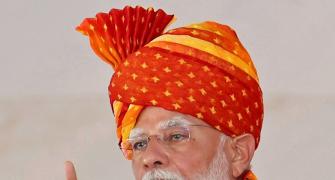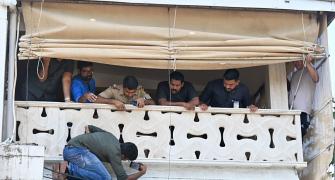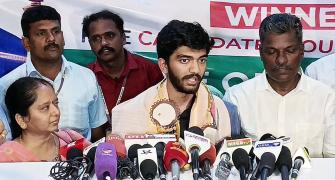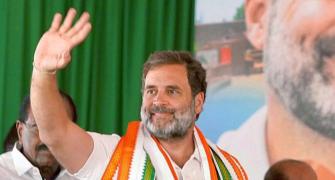Jointly organised by the Confederation of Indian Industy and the government of Tamil Nadu, the three-day event will start on September 8. CII first organised the conference in 2000.
The conference will see well-known speakers from academia, industry, government and professional bodies. Some of the star speakers at the event include Anil Ambani, Shiv Nadar, CEO, HCL, S Ramadorai, CEO, TCS and Pramod Haque, Norwest Ventures Partners.
The event will also have international participants from The Netherlands, Japan, Korea and Australia.
As chief patron, the Tamil Nadu chief minister Dr. M Karunanidhi will inaugurate the event. Union minister for communications and information technology Dayanidhi Maran will deliver the keynote address. In August 2006, Dayanidhi Maran had organised a road show in the Silicon Valley to woo investors to Tamil Nadu.
In this curtain raiser, Gopal Srinivasan, director, TVS Electronics, also the chairman of Connect 2006, speaks to Shobha Warrier on what can be expected from the event.
The theme of Connect 2006 is 'Creating Knowledge Driven Eco System'. Can you elaborate what you mean by 'eco-system' in this context?
When you look at the 9 or 10 elements that drive the ICT (Information, Communication and Telecommunication) industry like talent, entrepreneurship, hardware, telecom services, IT and IT enabled services, tier-2 cities, satellite towns, etc, you find that unless an ecosystem is there to connect these elements that are driven by knowledge, there will not be any growth. This industry is a knowledge driven industry, and hence, the theme is a platform for growth in Tamil Nadu.
Connect 2006 is all about showcasing the ICT industry - the hardware, software services - in India and specifically in Tamil Nadu. There is also a hardware boom starting in India now. The question we will ask at Connect 2006 is, where will we be in 2011? What are the key drivers that are going to make it happen? What should Tamil Nadu do to make sure that it remains the leader in the field?
The ICT industry in India is about $ 40 billion in terms of demand and export. Out of that, Tamil Nadu accounts for about $5 bn. In 2011, when the ICT industry in India will be around $120 bn or so, can Tamil Nadu account for $20-22 bn?
Is the focus at Connect 2006 on Tamil Nadu, or on India as a whole?
It is about both. The focus will be on Tamil Nadu because Connect 2006 is co-sponsored by the government of Tamil Nadu while CII is the primary organiser of the show. Another co-sponsor is STPI (Software Technology Parks of India) which is part of the government of India. So, we have CII, the government of Tamil Nadu and the government of India as partners of the show.
Where does India stand in the global arena?
The data explains everything. India's exports were $29 bn in the field of IT and ITES in the last fiscal. India employs around 1.3 million people (in this area). Nasscom says it will grow to about $60-62 billion and will employ 2.3 or 2.4 million people. India is obviously the star in the IT space.
India is on an upswing in hardware. We see a big opportunity in other related industries like infotainment or hardware, which is under-represented. The demand for the related industries is $11 billion but our production is much lower. But this will change with
Motorola, Nokia setting up plants in Chennai.
What should be done to drive robust growth in the hardware sector?
This is exactly what Connect 2006 is all about. We will bring people from various fields to engage them in discussions on how to make Tamil Nadu, an emerging hub in Asia, and we will also have people from Nokia talking about their success story. India can be in a unique position by using engineering design. According to Nasscom, India has the potential to grow in 5-6 years using engineering design. So, we have to find out how we can use engineering design to jumpstart manufacturing.
We will also discuss about the semi-conductor industry, telecom services and how they are creating inclusive growth by enabling things like e-governance, and low cost wireless. We believe that a state cannot be a leader in ICT unless it is a leader in e-governance using low cost wireless devices.
Why is India lagging behind in hardware?
I don't think we are lagging behind, we are under-served. The biggest volume growth India has seen today is in the area of consumer electronics. The telecom revolution of the handset is only two years old. But India is surging ahead. The question is, how can we accelerate this and do more? These issues will be discussed at Connect 2006.
There is a session on bridging the talent gap between IT and the BPO. What does it mean?
One of the fundamental challenges in the BPO and IT industry is the availability of suitable talent. India produces 600,000 engineering graduates every year. But employers complain about the quality of the graduates. I won't use the word quality; I will use the word suitability because quality is judgmental. So, there is no shortage in number.
A recent study found that only 27 per cent of the students graduating from various engineering colleges were suitable for the IT industry. So, we have to address the 'suitability' challenge.
At Connect 2006, we will discuss on how we can make these graduates more suitable for the IT and the BPO industry. Should we have finishing schools? Should we start after the 11th and the 12th?
Perhaps we can make them suitable for the jobs with the help of finishing schools. There will be a lot of discussion on how public-private partnership is working in this direction. If you take IIIT, Bangalore, it is a public-private partnership endeavour. Similarly, there will be a lot of discussion on how to make BPO a major industry and train people to manage BPO.
There are talks about the BPO industry slowly moving away from India because it is no longer financially viable to have operations in India. How will you look at this problem?
We have a session on satellite cities and tier 2 and tier 3 towns to address this issue. Today, India is being defined by 3 or 4 cities. We would like to focus on cities like Madurai, Trichy, Coimbatore, Tirunelveli, etc in Tamil Nadu itself. We have a speaker from Tirunelveli explaining how BPO can flourish there. A person from Coimbatore will talk about how Coimbatore developed its infrastructure and became a model Tier -2 city.
What is the session on 'Vision 2011' all about?
This session will see Anil Ambani talking about telecom services, S Ramadorai and Shiv Nadar will talk as the heads of India's largest IT companies. Pramod Haque the largest venture capitalist in 2005 will also speak at this session. These panellists along with Dayanidhi Maran will have a debate for 45 minutes, which will be moderated by Kiran Karnik, president, Nasscom. KPMG will document all the discussions. By the end of September, CII will present a proposed ICT policy for Tamil Nadu, which can be replicated in all the other states.






